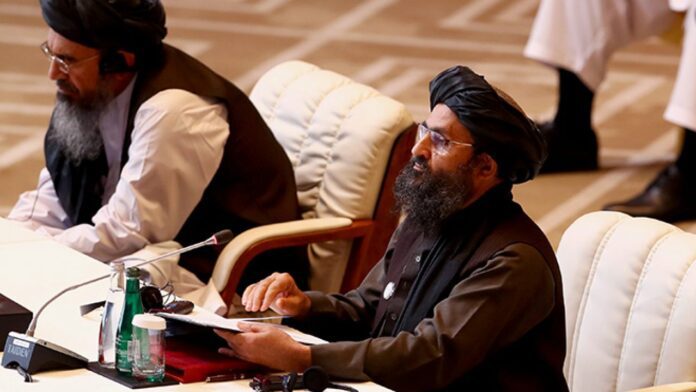The article discusses the challenges faced by the Taliban regime in gaining legitimacy and recognition from the international community. Engagement with the Taliban is the most realistic option for stabilizing the country, but there is still a long way to go to improve the situation for Afghans.
Legitimacy and recognition persist as significant problems for the Taliban regime to function as a globally accepted government and fulfill its responsibilities in the international system. The recognition of a country by the world paves the way for the acceptance of its representatives as diplomats, the ability to enter into state-to-state treaties, receive aid and development packages and legitimize access to its external assets.
The Taliban know that without adequate legitimacy and recognition, they will not be able to function effectively, will not enjoy the support of the Afghans or get engaged with other states to address the prevailing critical financial, political, and security issues in the country, but unluckily the regime has strictly been following its restricted mentality, uniquely preventing women and girls from attending schools and universities and failed to fulfill all the commitments they acknowledged in Doha agreement.
Despite the existence of all the above-mentioned obstacles the people of Afghanistan and international stakeholders have no better choice other than avoiding falling into past patterns of getting involved in taking arms, supporting armed struggle against the Taliban, backing proxies, or routinely pounding their enemies from the air. Neither of these options is likely to improve the current critical circumstances. Carefully organized, strictly monitored, and occasionally assessed the scale of engagement with the Taliban might seem adverse efforts but would most probably be the best in bad options.
The Taliban victory has brought a change of unusual calm to Afghanistan, as the bloodshed rate was significantly reduced the Taliban took over, across the country, but all is not well. There is a lot to be done domestically and globally for legitimacy and recognition.
As the Taliban have seemingly succeeded to consolidate power in Afghanistan and a better alternative is lacking, states and institutions inevitably engage with them to provide humanitarian assistance to Afghans living below the poverty lines. The engagement only reflects a mutual understanding, not legitimacy. The advantage of this temporary leverage could gradually push the Taliban toward moderation, including lifting the ban on female education, human rights, inclusiveness, and the security concerns of the world community.
Of course, the greatest concern of the world community is the existence of proclaimed foreign militant groups in the region and the biggest demand of the Afghan people is lifting the ban on female education. The outsiders including the neighboring countries should strictly avoid any temptation to return to war or drone strikes and must press the Taliban to let the girls go to educational institutions and honor their commitments in Doha agreement.
Additionally, by engaging the Taliban to initiate reforms, professionalize their forces, try to learn from their critics, and enforce their policy offering amnesty to officials and security forces of the previous government.
Afghanistan, from a security point of view, under Taliban rule, is significantly more peaceful than two years ago, but with the probability of major potential insecurity threats if not effectively handled.
Looking at the pace of the armed opposition in Afghanistan, the Taliban do not face a major threat to their grip on power, but there still are huge challenges. The challenges don’t seem to be resolved soon and could have implications beyond Afghanistan’s borders.
The Taliban, however apparently seem to have taken some steps to control militant groups, such as moving foreign militants away from zero points into main cities and refugee camps to make cross-border attacks more difficult and easily keep an eye on them Taliban authorities. To obtain the support of the Afghans and to address the concerns of the neighboring and regional countries, the Taliban ought to strictly fulfill the obligations and responsibilities they acknowledged to comply within the context of the Doha agreement.
A critical scenario that could result in deteriorating security might occur if militant groups receive substantial support from regional or other foreign proxy players as it happened in the last two decades. Some regional countries sometimes highlighted their warm relations with anti-Taliban groups, which have only deepened the Taliban’s concerns.
Luckily some Senior U.S., British, and European Union officials have directly stated or indirectly signaled their unwillingness to support the Taliban’s armed opposition. Taking such a stand by the world community and avoiding supporting those who seek to bring political change through armed resilience, truly reflects the aspirations of the Afghan people and would more probably help political pressure succeed in a more civilized manner.
Neighbors, Regional, and Western stakeholders have different views about threats derived from Taliban-managed Afghanistan, but they all share security-related concerns.
The Afghans and some of the regional stakeholders are cautiously trying to engage with the Taliban as the only realistic ground reality having the capability to stabilize the country. There still have positive changes since the Taliban’s takeover but the positive developments have been overweighed by the negatives and unrealistic attitudes of the current rulers. For the time being, having no alternative to getting engaged with the Taliban is hopefully the favorable prevailing option, as the country could still become safer for Afghans and the rest of the world.
Despite having the desire for more engagement with the world, the Taliban continued their hardline policies, forbidding education for girls and ignoring constant demand for more inclusivity and less repression.
It is hereby recommended that the Taliban should seriously realize that the history of more than four decades of Afghanistan suggests that alternative and armed resilient groups against the regime do not take long to emerge. It also demonstrates a tendency for external players to support their proxies in Afghanistan. Even if the country does not turn back into a conflict of civil war, in the short term, there seems no end to the sufferings of the Afghan people.




